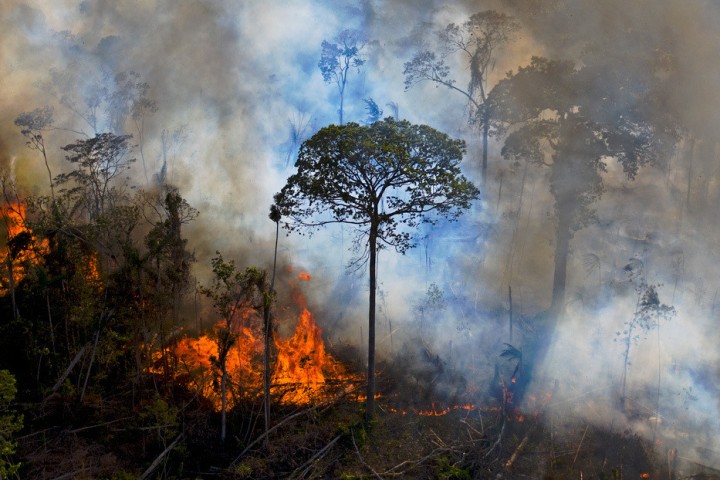Do not trust Brazil’s ‘greenwashing’ promises, say Amazon activists

Satellites show that deforestation in the Amazon is at its highest level since 2012. Photograph: Carl de Souza/AFP/Getty Images
Amazon forest defenders are urging delegates at Cop26 not to trust the “greenwashing” promises of Jair Bolsonaro’s government, which has wreaked havoc on the environment over the past three years.
Brazil will field one of the biggest delegations at the UN climate talks in Glasgow and fund a lavish promotional pavilion inside the conference centre. According to the agriculture minister, Tereza Cristina Corrêa da Costa Dias, and the environment minister, Joaquim Alvaro Pereira Leite, the message is that Brazil is “a longtime champion of the environmental agenda and an agrifood powerhouse”.
But climate activists say the world should pay more attention to the destructive policies of the recent past than vague promises about the future, which they say are aimed at securing cash.
Suely Vaz, a former head of the environment regulator Ibama who now works for the Climate Observatory, said the Brazilian government had gutted forest protection agencies and tried to change the law in favour of farmers and land grabbers.
“Nowadays Brazil has an anti-environmental policy. They are paralysing everything. Deforestation and forest fires are out of control. This must change to ensure that climate money – which is important for our country – can be used in very detailed, specified way,” she said.
Carlos Rittl, a senior policy adviser at the Rainforest Foundation Norway, said Brazil should not get away with a makeover that aimed to shake its pariah reputation under Bolsonaro. “It will be the biggest team ever. They are spending a lot on communications. Agriculture and industry will be there and a big comms team trying to sell the world a different image. But the world needs to hold Brazil accountable to the truth. The satellites don’t lie.”
Satellite images show deforestation is at its highest level since 2012. More than 10,000 square kilometres were lost in the 12 months to July – an area nearly seven times bigger than greater London, and an increase of 57% on the previous year. Scientists say the rainforest is approaching an irreversible tipping point after which it would degrade into a dry savannah.
Every nation is supposed to come to Glasgow with a more ambitious climate plan so the world can move closer to the Paris agreement’s goal of holding global heating as close to 1.5C as possible. The vast majority of governments have promised stronger action, but when Brazil updated its national climate plan last December it weakened its targets and allowed an extra 400 megatonnes of emissions. Climate Action Tracker rated this “highly insufficient”.
Brazil has often proved a key player at climate talks and its negotiating team is highly respected. Since Bolsonaro took power, however, the country has become notorious for nationalist, anti-globalist policies. One of its first acts was to abandon plans to host the 2019 Cop. At the subsequent meeting in Madrid, the NGO Climate Action Network presented Brazil with the “colossal fossil” award for least progressive country.
At Glasgow, Brazil will show a less fractious face. This is largely due to the shift in Washington. While Donald Trump was in the White House, Bolsonaro was emboldened to denigrate international cooperation on the world stage. Since Joe Biden came to power, he has been forced to drop his two most globally toxic representatives: the former foreign minister Ernesto Araújo, and the former environment minister Ricardo Salles. The new environment minister, Joaquim Leite, who will head the Brazilian delegation at Glasgow, is far more personable, but activists say he has done little to change the destructive policies of his predecessor.
At Biden’s climate summit earlier this year, Bolsonaro promised to meet a goal set by one of his presidential predecessors, Dilma Rousseff, to halt illegal deforestation by 2030. But this threatens to become meaningless because his supporters in Congress are trying to change the law to allow more legal forest clearance and invasions of indigenous land, which is usually the best-protected territory.
Inside Brazil, the heat is growing on Bolsonaro, who faces reelection next year. The economy is weak, his ratings are down and the senate wants to try him over the country’s 600,000-plus Covid deaths. Many in the agribusiness sector fear they will lose markets if the president continues to sully the country’s overseas image. Some farmers realise the rainfall for their crops depends on a stable Amazon rainforest.
Concessions are possible at Glasgow. Some observers expect Brazil to announce a green growth policy, tweak its national climate plan and compromise on one of the most contentious areas of the climate talks, the “article 6” debate on a market mechanism for climate action. This could unlock billions of dollars in carbon credits and other incentives.
A focus of Brazil’s delegation is the potential market for carbon, methane and conservation credits. These forms of financial support are intended to protect and restore the world’s great forests. This is a key goal of the UK hosts, who hope to announce a deal on Tuesday that would detail measures to halt and reverse forest loss by 2030, including greater support for indigenous peoples, moves towards deforestation-free supply chains, finance and regulations. The EU, Indonesia and the Democratic Republic of the Congo have agreed to this deal. Brazil is reportedly yet to sign.
Brazil and other developing nations will also be pushing wealthy countries to finally live up to their promise of $100bn a year in climate funding between 2020 and 2025. If approved, the key question is how to ensure the money is spent on projects that reduce emissions and climate impacts.
The situation is reminiscent of the US under Trump, when the rest of the world largely ignored the official US delegation at Cop summits while giving prominent space and attention to a rival gatherings of state governors, city mayors, NGOs and others supporting more ambitious emissions cuts.
The two very different sides of Brazil will be similarly present in Glasgow. While the official Brazilian pavilion will promote agriculture, a rival Brazil Climate Action hub will highlight the emissions-cutting efforts of Amazonian states, indigenous communities and civil society groups.

